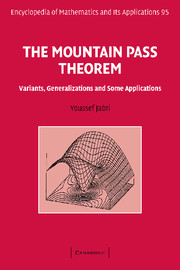Book contents
- Frontmatter
- Contents
- Introduction
- 1 Retrospective
- I First Steps Toward the Mountains
- II Reaching the Mountain Pass Through Easy Climbs
- III A Deeper Insight in Mountains Topology
- IV The Landscape Becoming Less Smooth
- V Speculating about the Mountain Pass Geometry
- VI Technical Climbs
- 22 Numerical MPT Implementations
- 23 Perturbation from Symmetry and the MPT
- 24 Applying the MPT in Bifurcation Problems
- 25 More Climbs
- A Background Material
- Bibliography
- Index
24 - Applying the MPT in Bifurcation Problems
Published online by Cambridge University Press: 04 September 2009
- Frontmatter
- Contents
- Introduction
- 1 Retrospective
- I First Steps Toward the Mountains
- II Reaching the Mountain Pass Through Easy Climbs
- III A Deeper Insight in Mountains Topology
- IV The Landscape Becoming Less Smooth
- V Speculating about the Mountain Pass Geometry
- VI Technical Climbs
- 22 Numerical MPT Implementations
- 23 Perturbation from Symmetry and the MPT
- 24 Applying the MPT in Bifurcation Problems
- 25 More Climbs
- A Background Material
- Bibliography
- Index
Summary
Bifurcation theory is a very far-reaching discipline in the midst of stormy development.
E. Zeidler, Nonlinear functional analysis and its applications. I. Fixed-point theorems. Springer-Verlag, 1984Rabinowitz successfully investigated bifurcation phenomena in some variational problems by an ingenious application of the ideas used in the proof of the MPT.
The solution set of a nonlinear problem may be very complicated and may change dramatically under a small perturbation, when the qualitative behavior of the natural phenomenon it models lacks stability. In particular, some branching and bifurcating solutions may appear. The object of bifurcation theory is precisely to study when there is a “branching” of new solutions. Bifurcation is a very important subject in modern nonlinear analysis that dates from the nineteenth century and to which many books and a multitude of papers have been devoted. It has found applications in many areas including elasticity theory, fluid dynamics, geophysics, astrophysics, meteorology, statistical mechanics, chemical kinetics, and so on. The mathematical side is also very rich. Bifurcation problems have been treated using many approaches: methods of function theory, algebra, algebraic geometry, critical point theory (both Morse and Ljusternik-Schnirelman approaches), algebraic topology, and differential topology. Nevertheless, the simplest cases may be solved using only the implicit function theorem.
Information
- Type
- Chapter
- Information
- The Mountain Pass TheoremVariants, Generalizations and Some Applications, pp. 288 - 295Publisher: Cambridge University PressPrint publication year: 2003
